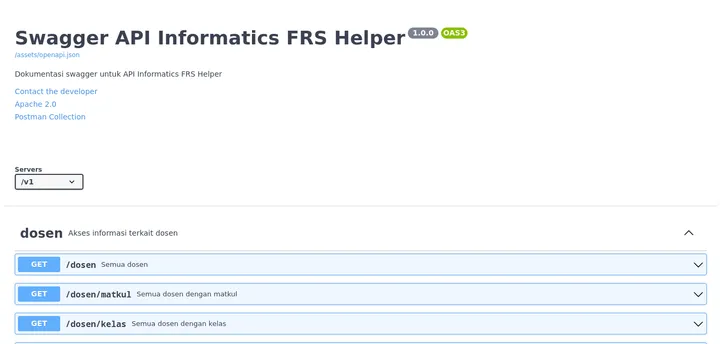
Introduction
The Informatics FRS Helper Public API is a robust RESTful service designed to facilitate access to detailed information regarding courses, lecturers, and classes. Leveraging cutting-edge technologies such as Rust, Axum, SQLx, and Tokio, the API ensures a balance of performance and safety.
Endpoints
The API offers various endpoints for accessing specific data:
- Courses Endpoint (/v1/matkul): Retrieve comprehensive information about courses.
- Lecturers Endpoint (/v1/dosen): Access details about lecturers.
- Classes Endpoint (/v1/kelas): Obtain information related to classes.
Documentation
For a comprehensive understanding of the API and its usage, please refer to the Postman Documentation. Utilize the Postman collection provided to seamlessly interact with the API endpoints. Postman offers a user-friendly environment for testing and exploring the functionality of the API.
Deployment
The API is efficiently deployed on Fly.io using a Docker container. Access the API through the following deployment URL: https://api-informatics-frs-helper.fly.dev
Tech Stacks
Rust
Rust is a multi-paradigm programming language designed for performance and safety, especially safe concurrency. Rust is syntactically similar to C++, but its designers intend it to provide better memory safety while maintaining high performance.
Axum
Axum is a web application framework that focuses on ergonomics and modularity. It’s built on Tokio and Hyper, and it provides everything you need to build robust and efficient web applications with Rust.
SQLx
SQLx is an async, pure Rust SQL crate featuring compile-time checked queries without a DSL. It enables you to interact with databases directly in Rust, ensuring type safety and connection handling.
Tokio
Tokio is a Rust framework for developing applications which perform asynchronous I/O — an event-driven approach that can often achieve better performance, lower latency, and greater resource utilization than conventional synchronous I/O.